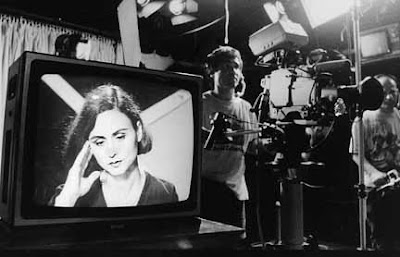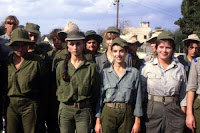 Hanna Azoulay-Hasfari (centre) with Ronit Elkabetz (left) and Yael Abecassis (right) in Shiva.
Hanna Azoulay-Hasfari (centre) with Ronit Elkabetz (left) and Yael Abecassis (right) in Shiva.POSTED BY
STUART HANDS
Assistant Programming Coordinator
Toronto Jewish Film Festival
Greeted with much enthusiasm at last year’s Festival was the Israeli feature film, Shiva, directed by actor Ronit Elkabetz (The Band’s Visit). Set during the first Gulf War, when Israel was under daily missile attacks, the film chronicles the Ohayon family as it is hit by its own tragedy when one of nine siblings dies suddenly. Shiva won the Wolgin Award for best Israeli feature film at the 2008 Jerusalem International Film Festival.
Winner of several awards for her performance as one of the sisters in Shiva, Hanna Azoulay- Hasfari is an Israeli playwright, documentary filmmaker, and well-respected actor who has appeared in some of the country’s most notable films (such as Savi Gabizon’s Lovesick on Nana Street, Roni Ninio’s The Quarry, and Avi Nesher’s Rage and Glory). She also wrote and starred in the influential and groundbreaking Israeli film, Sh’chur (1994). Based loosely on her relationship with her Moroccan family, the film embodies Azoulay-Hasfari’s personal straddling between East and West cultures.
I had the chance to speak with Hanna Azoulay-Hasfari as she reflected on some of her films, growing up as a Moroccan Jew in Israel during the 1970s, as well as her theatrical training through the IDF theatre troupe, the Tel Aviv University theatre programme, and her years with the fringe group, The Simple Theatre, initiated by her husband, playwright and filmmaker Shmuel Hasfari.
 Left: Savi Gabizon's Lovesick on Nana Street (Azoulay-Hasfari second from right).
Left: Savi Gabizon's Lovesick on Nana Street (Azoulay-Hasfari second from right).Do you think that the women in Shiva have any real power in their marriages?
No. They rely on the ancient way of being strong: by being manipulative. But they don’t have any other choice. I wish they were not so manipulative. The men, on the other hand, don’t have to be manipulative because they have the right not to be, as they are the ones that rule the house. In Shiva, when it comes to the decisions of selling of the house and helping the big brother, the women are not consulted at all. Perhaps the women in Shiva are more liberated than they are in Sh’chur; but if they are more liberated, they pay a high price for it. Maybe they are ultimately getting what they want, but it’s from being very difficult.
 Azoulay-Hasfari as Rachel/Cheli in Sh'chur, which she also wrote. Her husband, Shmuel Hasfari directed the film.
Azoulay-Hasfari as Rachel/Cheli in Sh'chur, which she also wrote. Her husband, Shmuel Hasfari directed the film.The mother in Sh’chur uses magical powers. Do you think that’s a way for her to obtain a sense of power and control within the family?
Of course. Let’s talk about the characters of the mother [played by Gila Almagor] and Pnina [the sister played by Ronit Elkabetz] in Sh’chur. The mother and Pnina are ruling the house, and every problem in this family is treated by their magical powers. They don’t think twice, they just use these powers because this is the only way they know. When Pnina is sent to the institute, all the power of this culture is taken from her and she is just seen as crazy. Before that, she is not crazy—you don’t know what she is: perhaps she is a very great power, perhaps a kind of medium. The mother is simply a Moroccan woman who controls this house by this magic power. But the influence of this power changes as Western culture increasingly influences her children. So the youngest child, Cheli (which is the character that represents me) is not influenced at all by her mother’s powers; Cheli sees it as very primitive and disgusting. And she is afraid of it—thank god she’s afraid of it—as these fears prompt her to come back twenty years later and reflect on it, and maybe accept it.
How close is your film, Sh'chur, to your own family background?
Pretty close. When I wrote it, my family was always on my mind. Like Cheli in the film, I grew up in the 70s. I was born and raised in a very similar kind of neighborhood and culture. With the exception of the mother and father in the film, most of the characters are represented quite accurately. Although some of the characters are not based on my family. The character of Pnina, the sister that Ronit Elkabetz plays, is based on someone from my neighborhood; I decided to include her in my script to deal with all my ambivalent feelings about this character, and what I feel, as a grown woman, about this culture. The little girl in this film, Cheli, is me when I was a child. And Cheli as an adult represents me at the time I wrote Sh’chur.
In Sh’chur, there is an environment of superstition? Was it similar when you were growing up?
Yes, but I wouldn’t call it superstition. With this film, I was trying to change the way we see those primitive acts or primitive behavior or ceremonies. I don’t know how to describe it, but it’s not superstition—it’s a culture. I don’t think there is such a thing as high culture or low culture, or good culture or bad culture. Any culture has both bad things and good things about it. Of course, as an adult, one has to decide which aspects of the culture are good for you and which are not, and then behave according to your choices.
Growing up, were you eager to assimilate into Israeli mainstream society like Cheli is in Sh’chur?
Of course. Since Israel was dominated by the Ashkenazi Western culture, belonging to a minority, I wanted to assimilate into the dominating culture. I can understand why I felt like that: All the culture around me—all the television, all the newspapers—was saying that my culture was bad… I wanted to turn my back to this culture and this past. Thank god I couldn’t. Thank god I had my husband to tell me that it wasn’t a smart thing to do. He told me that I had to confront and rebuild my past and rebuild my attitude to this culture, otherwise I’ll have nothing. And since then, I don’t feel cut to pieces; I feel more whole.
Did you watch much Israeli film when you were growing up?
No. I didn’t. First of all, in the neighborhood where I grew up, we were so poor that we couldn’t see very good films. (We saw only Indian and Arabic films.) And when the Boureka films were released to the theatres, I was studying at a boarding school for gifted children. And in this school, we weren’t allowed see these Boureka films because we were expected to see only “good” films, like Hitchcock films for example. After I finished school, I saw those Boureka films later and I didn’t see myself—or the group I came from—represented properly in them. When I made Sh’chur, it was considered a great breakthrough in terms of the Israeli cinema’s representation of the Mizrahim.

Right: Azoulay-Hasfari (2nd from left) in her second film, Banot (1985)
I read that your earliest acting experiences were with the IDF entertainment troupe. Would you talk about your experiences there?
When I went to the audition for the troupe, I knew nothing about theatre. But I was lucky because the director of it was Nola Chilton, an American director who had a very nice theatre group here in Israel; she was really a revolutionary. She started a theatre of social protest here. When she heard about me and where I came from, she immediately included me in her group. And so here I was in a play by Thornton Wilder and I played a small part. For a year, we brought theatre to the soldiers in all kinds of military posts. We went to the Sinai before they gave it back to Egypt, and there were a lot of military posts. So one week we were in Sinai, and one week we were in the north, and two weeks we were in the middle of the country. We know about theatre. We just brought theatre to those poor, poor soldiers. It was a really interesting experience. And then I went to the university afterwards.
Would you talk about your experience studying theatre at Tel Aviv University?